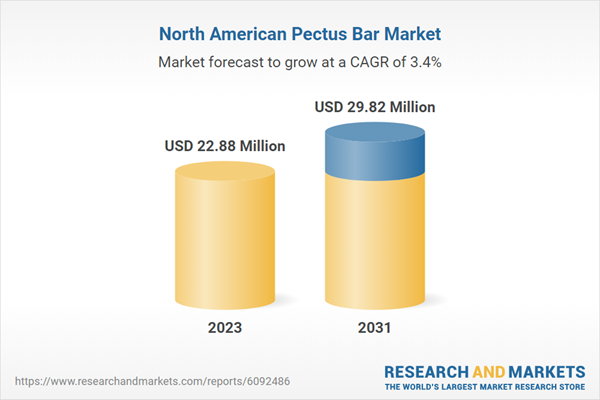Use of Biocompatible Materials Fuels North America Pectus Bar Market
Pectus bars are typically made of stainless steel that contains nickel and chromium components. These components can cause allergic reactions, leading to fever and allergic dermatitis. Due to allergic complications of stainless-steel bars, titanium bars are being preferred across the globe. However, the cost of titanium is higher and also, they are less plastic i.e. they cannot adjust according to the structure of chest which has a negative impact on stabilizing the bar. Thus, various biodegradable materials are now being used to develop pectus bars. Recently, polylactide (PLA) and polylactic-co-glycolic acid (PLGA) have gained traction in the manufacturing of absorbable pectus bars.PLA is biodegradable and inactive thermoplastic aliphatic polyester derived from renewable resources such as cornstarch. PLGA presents sustainable drug-eluting capacities that provide controlled delivery of various pharmaceuticals and biomolecules (such as growth factors) for enhancing bone healing, extended discharge of antimicrobial agents for infection control, and biomimetic mats for tendon/ligament repairs.
Using biocompatible materials is favorable as they are directly absorbed in the body, owing to which a second surgical procedure can be avoided for the removal of pectus bars. Furthermore, these materials can be combined with pharmaceuticals for healing and have similar elastic modulus to bone, which can minimize stress shielding. Thus, the increasing focus on using biocompatible materials that are more effective and cost-efficient for manufacturing pectus bars is fueling the market growth.
North America Pectus Bar Market Overview
In North America, the US is the largest market for pectus bars. Pectus bars are used for the treatment of pectus excavatum and pectus carinatum, which affect the physical appearance and, in some cases, may affect the respiratory function. As per an article published in Elsevier journal in 2024, pectus excavatum affects one in every 400 newborns in the US, and in 40% of the cases, the patient has a family history of chest wall deformities.As the country has well-developed healthcare facilities and infrastructure, surgical procedures are executed effectively. Moreover, the adoption of 3D printing technology and advanced imaging technology helps in the development of customized solutions for better outcomes creating the demand for pectus bars and provide impetus to its market growth in the coming years.
North America Pectus Bar Market Revenue and Forecast to 2031 (US$ Thousand)
North America Pectus Bar Market Segmentation
The North America pectus bar market is categorized into type, end user, and country.- Based on type, the North America pectus bar market is bifurcated into titanium and stainless steel. The titanium segment held a larger market share in 2023.
- In terms of end user, the North America pectus bar market is segmented into hospitals, specialty clinics, and others. The hospitals segment held a larger market share in 2023.
- By country, the North America pectus bar market is segmented into the US, Canada, and Mexico. The US dominated the North America pectus bar market share in 2023.
Reasons to Buy:
- Save and reduce time carrying out entry-level research by identifying the growth, size, leading players, and segments in the North America pectus bar market.
- Highlights key business priorities in order to assist companies to realign their business strategies.
- The key findings and recommendations highlight crucial progressive industry trends in the North America pectus bar market, thereby allowing players across the value chain to develop effective long-term strategies.
- Develop/modify business expansion plans by using substantial growth offering developed and emerging markets.
- Scrutinize in-depth North America market trends and outlook coupled with the factors driving the North America pectus bar market, as well as those hindering it.
- Enhance the decision-making process by understanding the strategies that underpin commercial interest with respect to client products, segmentation, pricing, and distribution.
Table of Contents
Companies Mentioned
Some of the leading companies in the North America Pectus Bar Market include:- KLS Martin Group
- Biotech GmbH
- Zimmer Biomet Holdings Inc
- Ventura Medical Technologies
- MedXpert GmbH
Table Information
| Report Attribute | Details |
|---|---|
| No. of Pages | 45 |
| Published | March 2025 |
| Forecast Period | 2023 - 2031 |
| Estimated Market Value ( USD | $ 22.88 Million |
| Forecasted Market Value ( USD | $ 29.82 Million |
| Compound Annual Growth Rate | 3.4% |
| Regions Covered | North America |
| No. of Companies Mentioned | 6 |









